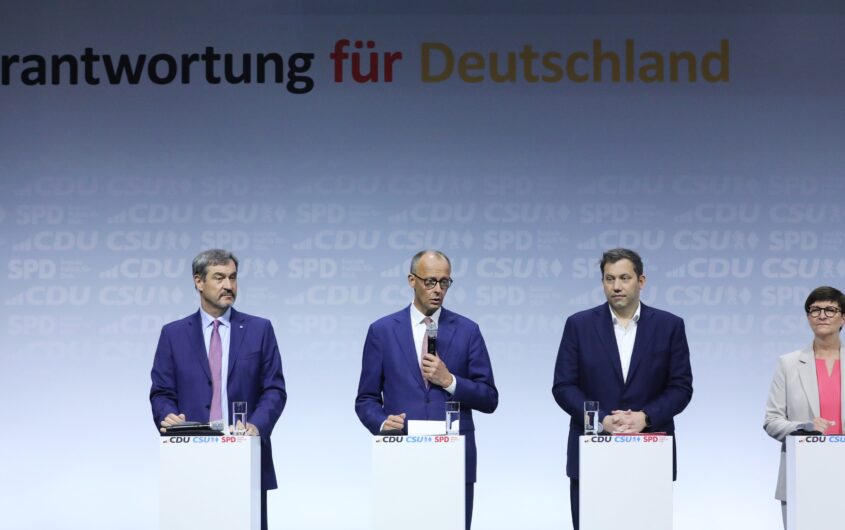
Martin Rulsch via Wikimedia Commons
150 Days of the Merz Government

Luca Vozzi
Georgetown University
Luca Vozzi is a master’s student in the European Studies program at Georgetown University’s School of Foreign Service, focusing on transatlantic relations and comparative politics. He currently works as a Research Assistant to Prof. Eric Langenbacher, contributing to research on German and American political developments as well as the broader dynamics of U.S.-European relations.
Before coming to Georgetown, Luca Vozzi earned his bachelor’s degree in Political Science from the Freie Universität Berlin, where he specialized in international relations and political institutions.
He has professional experience within German politics, including positions at the German Bundestag, the Federal Foreign Office, as well as work for the Christian Democratic Union (CDU).
His research interests center on comparative governance, foreign policy, and the evolving role of Germany in Europe and the transatlantic partnership.
Between Reform and Restraint
When Friedrich Merz entered office as chancellor in May 2025, he did so under the banner of stability and reform. After the collapse of Olaf Scholz’s “traffic light” coalition at the end of 2024 and early elections in February 2025, the Union sister parties (Christian Democratic Union and Christian Social Union, CDU/CSU) and Social Democrats (SPD) agreed on an emergency Arbeitskoalition (working coalition)—the only viable majority that would prevent political paralysis. The political climate was tense: economic stagnation persisted, the war in Ukraine shaped European security discourses, and a rising far-right Alternative for Germany (AfD) challenged the democratic center. Against this backdrop, Merz promised a Herbst der Reformen (autumn of reforms) to show that his government could deliver where its predecessor had faltered. The coalition agreement sought to balance conservative priorities with social-democratic demands. On the one side, the CDU/CSU emphasized tax relief for business, defense buildup, and stricter migration policy, whereas the SPD focused on safeguarding welfare programs, education, and workers’ rights. It was, by nature, a fragile compromise—a coalition of necessity rather than conviction, designed to hold together a weakened Union and a historically diminished SPD.
In its first months, the government projected unity. Ministers avoided public clashes, and Merz cultivated an image of decisiveness abroad, most visibly during his June visit to the White House, where President Donald Trump called him a “very good man to deal with.” But, by late summer, familiar tensions re-emerged over spending, welfare, and foreign affairs. The long-delayed 2025 budget, adopted in September after weeks of negotiation, authorized €502.5 billion in spending, €25 billion more than the previous year. Around €190 billion went to labor and social affairs, including €122 billion for pensions and €52 billion for unemployment and basic income support. Defense saw the largest proportional rise, reaching €86 billion when combined with allocations from the new Bundeswehr special fund (Sondervermögen). At the same time, the government established a new €500 billion Sondervermögen spread over twelve years, aimed at long-term investment in climate protection, infrastructure, and education. While the SPD hailed it as proof that fiscal consolidation would not mean social retreat, critics accused the coalition of masking debt and sidestepping the constitutional debt brake.
SPD Finance Minister Lars Klingbeil’s draft 2026 budget projected spending of €520 billion and borrowing close to €90 billion, with one-third of expenditures effectively debt-financed when special funds are included. Defense remained a priority, but disputes flared between Klingbeil and CDU Transport Minister Patrick Schnieder over additional billions for infrastructure. Social spending, nearly €197 billion, dominated the budget and highlighted the coalition’s central tension: fiscal restraint versus social stability. Medium-term forecasts painted a grim picture: structural deficits of €34 billion annually from 2027 onward, totaling €172 billion by 2029. Conservatives called for reducing entitlements and curbing the growth of the welfare state; the SPD advocated higher taxes on top incomes and capital gains. For now, compromise means increased defense spending, continued infrastructure programs through special funds, and only modest welfare adjustments. Yet the underlying fiscal dilemma remains unresolved.
The coalition’s debate over Bürgergeld, Germany’s basic unemployment support, became its most visible domestic conflict. Conservatives argued that the system had become too generous, discouraging work and attracting migrants. Bavarian Minister-President and head of the CSU Markus Söder demanded several billions in cuts and tighter controls. SPD ministers resisted, warning that deeper reductions would inflame social tensions. This standoff captured the government’s broader struggle: how to combine fiscal discipline with social protection. By October, after months of stalemate, the coalition reached its first major internal compromise. The Bürgergeld will be transformed into a new Grundsicherung, a streamlined basic income program emphasizing activation over passive support. The reform reintroduces the principle of “support and demand”: those able to work will face stricter participation requirements but also receive stronger assistance with training and placement. For the CDU/CSU, it marked a symbolic victory for their call to strengthen individual responsibility and held at the same time their election promise; for the SPD, it preserved the social safety net in a politically acceptable form.
Merz remains constrained at home by coalition arithmetic and a modest majority in the Bundestag.
The same October package introduced the Aktivrente (active pension), allowing pensioners to earn up to €2,000 per month tax-free after reaching retirement age. The measure, effective January 1, 2026, aims to encourage older professionals to remain in the labor market and relieve pension pressures. A new Pension Commission, to be established by year’s end, will propose longer-term structural reforms by 2026. These steps illustrate the coalition’s gradual shift from short-term crisis management toward cautious reform, even as deeper systemic questions remain.
Infrastructure policy has become another pillar of the Merz government’s early agenda. Following the October coalition talks, Merz announced that “everything ready for construction will be built”—a pledge to accelerate both road and rail projects. An additional €3 billion will flow into transport development, with a review scheduled after two years. The plan also expands public-private partnerships and introduces €3 billion in subsidies for electric-mobility programs targeted at low- and middle-income households. These measures, together with new digital-government initiatives and AI-based efforts to cut bureaucracy, are intended to revive investment and address Germany’s long-criticized sluggish administrative processes.
Another prominent decision came in early October: the abolition of the so-called turbo-naturalization scheme, introduced by the Scholz government to fast-track citizenship for highly integrated foreign residents after three years. In practice, the scheme had seen very few cases—barely two thousand nationwide—hindered by bureaucracy and staffing shortages. The Merz government, particularly under pressure from the Union party’s conservative wing, argued that citizenship must remain “a high and serious commitment.” The repeal reflects a broader recalibration of migration policy, favoring integration incentives over accelerated naturalization.
Beyond domestic reform, the Merz government has faced friction over defense and foreign policy. Defense Minister Boris Pistorius’s new Wehrdienstgesetz (military service law), based primarily on voluntary military service, passed after months of dispute. The Union had demanded a partial return to compulsory service to close the Bundeswehr’s manpower gap. Meanwhile, the August decision to suspend certain arms exports to Israel highlighted deep divisions within the cabinet: Foreign Minister Johann Wadephul (CDU) initially defended Germany’s historic responsibility toward Israel, while members of the SPD left urged alignment with EU sanctions. These debates underscored the coalition’s delicate balance between moral commitments and strategic interests.
Finally, one of the defining features of the Merz administration has been its reliance on expert commissions to defuse intra-coalition conflict. Fifteen commissions now operate on subjects ranging from electoral reform and pensions to debt-brake revision. While officially designed to ensure technical rigor and cross-party consensus, their proliferation has drawn criticism as evidence of governmental hesitation. The Debt Brake Commission in particular, divided between fiscal conservatives and reform advocates, mirrors the coalition’s ideological divide. Whether these bodies will deliver tangible reforms or merely postpone decisions remains to be seen.
After 150 days in office, the Merz government stands at a crossroads. Its early promise of sweeping reform has given way to incremental compromise—progress achieved mainly through negotiation rather than vision. The abolition of turbo naturalization, the launch of the Aktivrente, the transition to a new Grundsicherung, and fresh investment in infrastructure demonstrate movement but not momentum. Merz himself remains popular abroad, seen as a stabilizing European voice in Washington and Brussels, yet constrained at home by coalition arithmetic and a modest majority in the Bundestag. What began as an autumn of reforms has evolved into a season of managed restraint, a government balancing between necessary change and the limits of political reality. Whether this autumn of tepid reforms will truly materialize or give way to a winter of unfulfilled promises remains to be seen. Polls and an ever-stronger AfD, however, suggest that both the government and Chancellor Merz are under growing pressure to act.








